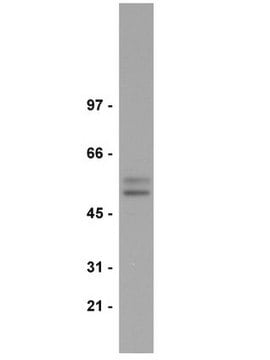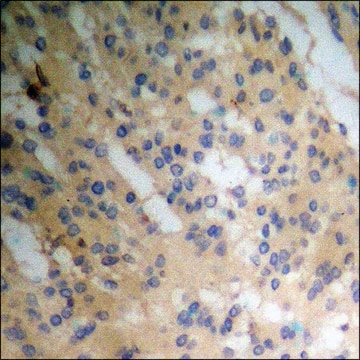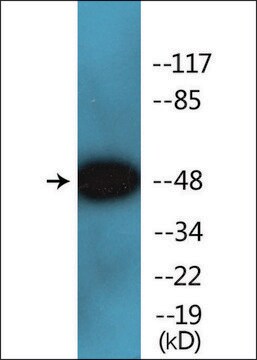05-1459
Anti-SMAD1 Antibody, clone AS22
clone AS22, from mouse
Synonym(s):
SMAD 1, SMAD family member 1, SMAD, mothers against DPP homolog 1, MAD, mothers against decapentaplegic homolog 1, Mad-related protein 1, Mothers against DPP homolog 1, Sma- and Mad-related protein 1, TGF-beta signaling protein 1, Transforming growth fac
About This Item
Recommended Products
biological source
mouse
Quality Level
antibody form
purified antibody
antibody product type
primary antibodies
clone
AS22, monoclonal
species reactivity
mouse, human
technique(s)
immunofluorescence: suitable
western blot: suitable
isotype
IgG1κ
NCBI accession no.
UniProt accession no.
shipped in
wet ice
target post-translational modification
unmodified
Gene Information
human ... SMAD1(4086)
General description
Specificity
Immunogen
Application
Signaling
This lot detected SMAD1 at 1:500 dilution in HeLa cell lysate resolved via SDS-PAGE and transferred to PVDF.
Quality
Western Blot Analysis:
This lot detected SMAD1 at 1:500 dilution in HeLa cell lysate resolved via SDS-PAGE and transferred to PVDF.
Target description
Linkage
Physical form
Storage and Stability
Handling Recommendations: Upon receipt, and prior to removing the cap, centrifuge the vial and gently mix the solution.
Other Notes
Disclaimer
Not finding the right product?
Try our Product Selector Tool.
recommended
Storage Class Code
12 - Non Combustible Liquids
WGK
WGK 1
Flash Point(F)
Not applicable
Flash Point(C)
Not applicable
Regulatory Listings
Regulatory Listings are mainly provided for chemical products. Only limited information can be provided here for non-chemical products. No entry means none of the components are listed. It is the user’s obligation to ensure the safe and legal use of the product.
JAN Code
05-1459:
Certificates of Analysis (COA)
Search for Certificates of Analysis (COA) by entering the products Lot/Batch Number. Lot and Batch Numbers can be found on a product’s label following the words ‘Lot’ or ‘Batch’.
Already Own This Product?
Find documentation for the products that you have recently purchased in the Document Library.
Our team of scientists has experience in all areas of research including Life Science, Material Science, Chemical Synthesis, Chromatography, Analytical and many others.
Contact Technical Service








